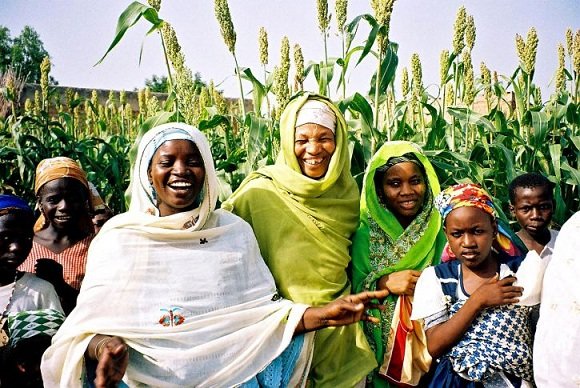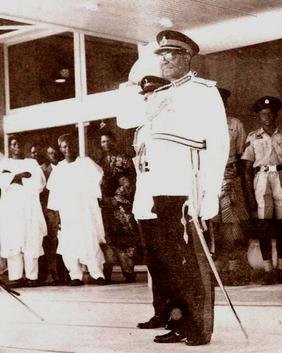ADSactly History : Emergence Of Nigeria As A Political Entity [Part 2]
Emergence Of Nigeria As A Political Entity [Part 2]
In our last post, we took a look at the amalgamation process of Nigeria - the first and the second amalgamation processes. However, one question was left unanswered from our last post and that is; "was the amalgamation process of Nigeria advantageous or disadvantageous to Nigeria, both as a people and as a nation?" Here, we will look at the resultant effects of the amalgamation.

Resultant Effects of the Amalgamation
No doubt, the main idea behind the amalgamation of Northern and Southern protectorates was to create a single political unit out of Nigeria. However, things did not turn out exactly as it was expected because it raised other questions with difficult answers. Firstly; with the superlatively static disposition of the Fulanis (Northern Nigeria); for example; being amalgamated with the dynamic, individualistic and egocentric community of the South, what will you expect from such amalgamation?
Maybe you will be interested to know this; in the pre-colonial/colonial times, acquiring of formal knowledge and western education was mostly seen in the Southern part of Nigeria because of their contact with missionaries that established mission schools there. On the other hand, the Fulanis, during that time, were majorly traditionalists - no wonder both protectorates were in rivalry and often led to hostilities. Uniting these two protectorates to form an entity that is governed by one administration has been inferred by many to be one of the greatest colonial errors in Nigeria.
Some have also quipped that the amalgamation itself was not harmful (at least, unity can also be found in cultural and ethnic diversity) but the administration that was introduced by the British after the amalgamation process suggested isolationism even in the midst of the amalgamation. Take a look at this scenario: The main amalgamation took place in the year 1914 and everyone would have expected a full emergence of one political unit, but the case was not so. From the period of 1914 to 1939, Nigeria functioned as a federation (or rather a society) of two distinct protectorates or provinces.
However, by the mid 1939, the British authority that ran the administration of Nigeria sub-divided the defunct Southern province to get Western province and Eastern province. This triune sub-division remained like that until Nigeria gained her independence and other regions were created - like the mid-west, and the North was further sub-divided. This is why, in this present time, Nigeria is sub-divided into regions (North-east, North-central, South-south, South-east, South-west etc) but still under one administration.
Colonialism and the People of Nigeria
It is worthy to note that colonial rule and colonialism at large was done without prior consent from Nigerian populace. Just like we saw from our last post, the original idea behind colonialism was never in benefit of Nigeria but for exploitation and personal economic reasons - this was the reason many prominent Nigerians (the likes of Dr. Nnamdi Azikiwe, Chief Obafemi Awolowo) rose up and fought for her independence.
It became clear that the colonial masters were interested in the cheap and abundant raw materials in Nigeria for their manufacturing processes, at the same time, they saw Nigeria as a ready market for their manufactured goods. This was the reason the policies of colonialism in Nigeria was majorly tilted towards favouring their own economy and highly benefited the British lords without recourse to the opinion of Nigerians themselves. Putting it in clearer terms, Nigerians became foreigners (or more like strangers) in their own fatherland.

Nationalism Movements
Owing to the fact that Nigerians were excluded from participating in governmental activities and economic process in their own fatherland, some Nigerian activists and revolutionists rose up to call for immediate reform in the entire system. These activists formed some nationalism movements to press home their demands.
Their demands were very simple; they wanted to benefit from the system of government in their own country. Much more than that, they wanted to be independent of colonialism. The movements they formed to lead this course include:
NYM (Nigerian Youth Movement): This movement was established in 1936 by a group of like-minded Nigerian youths and other prominent patriarchs in the society, like Dr. Nnamdi Azikiwe (Zik), Ernest Ikoli, Chief Obafemi Awolowo, Samuel Akinsanya etc, to demand for independence of Nigeria. NYM was considered by many Nigeria history scholars as the first true pre-independence nationalism movement.
West Africa Pilot: This was a renowned media agency that was instrumental to the independence of Nigeria.
National Council of Nigeria and Cameroon: This movement also had Dr. Nnamdi Azikiwe as member. It was established in the later part of 1944 with the purpose of establishing a self-governing Nigerian nation which is void of European mandate and rulership.

All these aforementioned nationalism movements, and many others, worked together with one voice; to call for the actualization of independence for the Africa's most populous nation; Nigeria. in 1960, October 1, the declaration was made and Nigeria emerged as a self-governing nation and gained her independence with Dr. Nnamdi Azikiwe as the first indigenous Nigeria president.
Authored by @samminator
Click the coin below to join our Discord Server
)
Yeah right. More like an an untapped gold mine which they utilized for thier own good. While we loittered in anguish. It's a good thing we had people who fought against these encumbrance. But personally, I don't think we've learnt a thing
Absolutely truism bro. People say that history does not teach lesson.. Well, I think, to a large extent, they are right. Cos past errors have been repeated over and over again.
Thanks for coming around bro
As always, very interesting and informative post. I am curious about a couple of aspects in this process. First, how much did the British mix with local Nigerians? Did they embrace or promote racial amalgamation?
Also, how violent or non-violent was this independence process?
Has a balance been made about the advantages or disadventages of the British rule period?
Also how important was the role of religion in this process?
Right from the period of slave trade to the period of amalgamation and colonial rule, the policies were never in favour of the Nigerian populace but for the gain of the colonial masters. This was one of the reasons Nigeria demanded for her independence.
Thanks for reading buddy Henry
Hello @samminator
This is a well detailed piece on precolonial Nigeria, the events that precipitated agitations for independence and the various platforms via which the calls for independence were aired.
To this day...in my opinion, the decision to amalgamate North and South Protectorates was the greatest mistake committed by the colonialists. That's on the one hand; on the other hand, the stance of the supposed Zik of Africa not to have a divided nation was the greatest blunder of all times. Azikiwe wanted one Africa or more correctly one West Africa so that he would lord it over other minorities. This was his motivation for standing against regionalism.
I don't want to go deep into what transpired in those days but one fact that would continue to stand out is: where we, as a nation today, is not entirely as a result of colonial mistakes, our forebearers, most esp Zik, contributed to the problems of Nigeria as we have them today.
@eurogee
Thanks a lot Eurogee bro. I'm already piqued by your opinion about colonialism and amalgamation of Nigeria. I'd love to have a few more details if you wouldn't mind.
Thanks for coming around buddy
It feels so sad to know that Nigerian people were strangers in their own land because of colonialism. I must appreciate the efforts Nigerian heroes put in to bring about their independence.
Nice history piece @samminator
Sure it does, but that's one of the things that shaped our history. Yeah, our past heroes were very instrumental to our independence.
Thanks for reading bro
Behind some important facts of history, especially those that have to do with colonization, is money. Economic interest is one of the most common interests in the world. In my country it is said: the monkey dances for silver. From what I have read, Nigeria has one of the most prosperous economies in Africa and with the most growth possibilities in the world. I have also reviewed that like my country, Venezuela, it is a country dependent on oil exploitation. A great writer said that the countries that live on "Black Gold" have pawned their souls to the devil. As always, excellent publication, @samminator
Your first statement sums up the whole post. They had eyes on the rich mineral resources and manpower in Nigeria, that was the reason behind colonialism.
Thanks a lot Nancy
I must confess, I am impress by what I have seen here. I smiled reading through the lines where great heroes like
Dr. Nnamdi Azikiwe, Chief Obafemi Awolowo were mentioned. It is so painful that they fought for us to get us this far, by greed has killed us to the extent we see ourselves as blacks instead of brothers. This is not the reason they fought for Freedom, we have lost it and I just wished we can retract our ways.
Exactly bro. If only we can trail the paths of our past heroes, we'd be a force to be reckoned with in the committee of nations.
Thanks for coming bro
good country despite nothing. and people are kind and funny. I like it
Sure, Nigerians are good, accommodating, and kind.
Thanks Elena
Truly, uniting the two protectorates was a big mistake in Nigeria. Quite frankly, the difference between both protectorates was huge. The rivalry between them was no surprise. But the biggest error was the fact that after the amalgamation, both protectorates still continued to function as distinct provinces. If one political unit had emerged, that would probably have made the two protectorates to have a reason to work together, which could have perhaps led to better relationship between them.
Exactly buddy, the difference was very big. Even till now, both regions have very dissimilar way of living which has ultimately affected their relationship with others. Well, I guess we should all work towards a better Nigeria.
The evil that men do live after them. In my opinion, the greatest evil done by colonial masters for this country was the amalgamation, up till now, the less enlightened and high population has advantage has been ruling the more enlightened ,sophisticated and more Godly. Nigeria is the project of the British,until all of us see this country as ours, we will always have the divide.
We are truely amalgamated on paper, and officially but not in orientation. Our orientation need to be checked to see one Nigeria. Thanks for this post @adsactly and @samminator
Your last statement speaks volume. Thanks for this insight buddy. "One Nigeria" should not just be on paper but on orientation.
I think your article, @samminator, answers very accurately and solidly the question of the advantages or not of the so-called "amalgamation" in Nigeria. I believe that it will never be beneficial for a people to have measures or decisions imposed on them by forces or countries outside, unless it is an extreme case, as happened with Hitler's Nazi-fascism, where international intervention was the only solution to such a great threat to the rest of humanity.
It is almost obvious that the British had economic and political interests behind the "amalgamation". The assumption, on the part of the movements you point out, of the imperative of independence and autonomy was the right thing to do.
Beyond some information that comes from international reports (such as DW's) that show a prosperous Nigeria, I don't know the current reality of your country in a more specific way. I hope it is for the good of all the Nigerian people. Greetings.
The truth is; if history can be undone, many people will gladly choose the option of Nigeria becoming "unamalgamated".
Even though Nigeria has gained her independence, the effects of the colonial rule and the effects of the amalgamation process are still felt till date. This is the reason some people are calling for a split in Nigeria (to have Biafra, etc).
Thanks for coming buddy